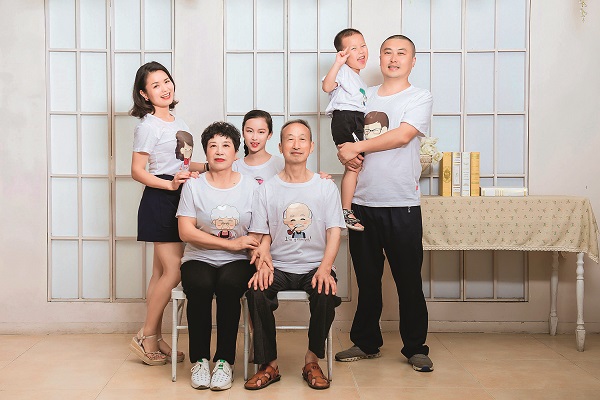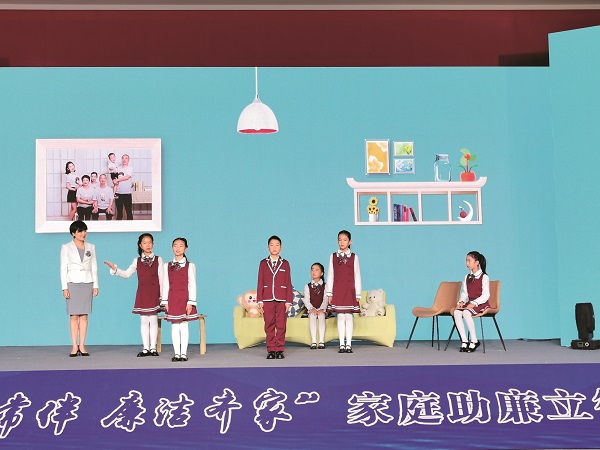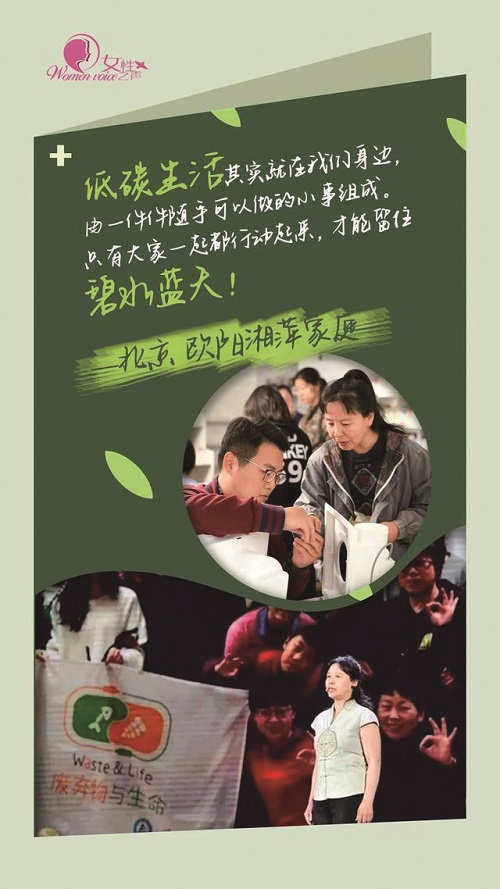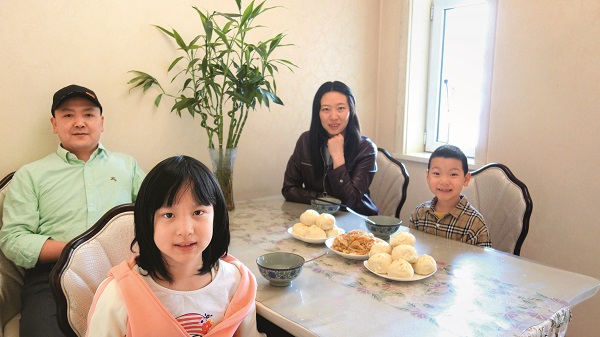Promoting Thriftiness, Ending Food Waste

As the traditional Chinese saying goes: When eating a mouthful of congee or rice, one should bear in mind that its production had not been easy. Thriftiness has always been a traditional virtue of the Chinese nation. Saying no to food waste is a family virtue worth carrying forward. Being thrifty and ending food waste in society requires the joint effort of governments, families, the catering industry — all segments of society.
Chinese President Xi Jinping has underlined the need for greater awareness of the risks posed to the country's food security, and he has called for resolute efforts to promote thriftiness and combat the wasting of food. Xi made the remarks in an instruction released on February 11, 2020.
While noting that food waste is a distressing phenomenon, Xi urged the nation to always be aware of the risks to food security, despite the fact China has achieved consecutive bumper harvests.
China is the world's largest producer and consumer of food supplies. Its annual grain output has stayed above 650 million metric tons for five consecutive years (since 2015).
Xi has stressed the need to enhance legislation and supervision, take effective measures, and establish a long-term mechanism to end food waste. It is necessary to further enhance public awareness of the issue, effectively cultivate thrifty habits and foster a social environment, in which waste is shameful and thriftiness is applaudable, Xi said.
Xi has long attached great importance to food security and, on many occasions, he has emphasized the need to stop the waste of food. He has described food security as "an important foundation of national security."
In response to Xi's call, the All-China Women's Federation (ACWF) has urged women, from all walks of life, to resolutely end food waste, effectively cultivate the habit of saving food, and promote thriftiness among the public, to create an atmosphere that is conducive to saving food.
The family is the basic unit of society. The ACWF has advocated the family virtue of thriftiness, and the federation has given full play to the role of women and families in promoting thriftiness and ending food waste in society. Women are encouraged to guide their children, and other family members, to cultivate the virtue of saving food and to practice a simple, green and low-carbon family lifestyle, which helps foster a social atmosphere in which everyone practices frugality.
Women's federations, at all levels, have launched various activities to advocate the virtue of being thrifty, and to increase public awareness about the need to end food waste.
To prevent food waste, China implemented a comprehensive — Clear Your Plate — campaign in recent years, with restaurants and canteens displaying anti-food-waste posters and banners. Media, meanwhile, has published content that promotes the virtue of frugality. Trade associations and governments, at all levels, have implemented concrete measures to reduce food waste. For example, Shandong provincial people's government stipulated government departments should promote buffets in their canteens and during official receptions to curb food waste.
The Anti-Food-Waste Law of the People's Republic of China, aimed at curbing food waste and safeguarding the country's food security, was adopted during the 28th Session of the Standing Committee of the 13th National People's Congress, on April 29, 2021. The law lays down the basic principles for food consumption, and it helps build a long-term mechanism to curb food waste. The law is also essential to the construction of a resource-conserving and environmentally friendly society.

What Families Do to End Food Waste
Setting Good Example, Passing on Family Traditions
Li Ya and her family live in Rongchang District, in Southwest China's Chongqing. There are six members of the family: Li, Li's husband, their two children and Li's parents-in-law.
Li's parents-in-law, both in their 70s, set an example for frugal living. They have been hard-working and thrifty all their lives, and they have always used everything, right to the last drop, and made the most of every penny. They advocate the family virtue of thriftiness, oppose extravagance and waste, and they set a good example for the family to follow.
In Li's family, virtually no food is ever wasted. For instance, the rice crust that forms on the rice cooker is never tossed out. Why? The grandparents use it to make congee. Noodles at breakfast are not divided into individual bowls; instead, the noodles are served in a big pot, on the table, so each person can take the amount he or she needs.
"If we make too many noodles for a meal, we usually save them for another meal. We will scoop out the noodles and drain them, then add sesame oil, ginger, garlic and chili pepper to make cold noodles, our local flavor. They are homemade, clean and economical. Isn't that great?" Li's parents-in-law say with smile.
They also transform empty milk cartons into watering cans, and they use kitchen waste as fertilizer, by fermenting the vegetables and fruits, which they grew on their roof.
Influenced by Li's in-laws, the family has developed a thrifty lifestyle, of which they are very proud. They oppose extravagance and excessive consumption, and they never try to keep up with the Joneses.

Li has always taught her children that food does not come easy, and that food must not be wasted. She has prepared books and science-education videos for her children, to teach them grain production is no mean feat. On weekends or holidays, she often takes her children to farms, so they can experience the hard work involved with farming. As such the children have gained a deep understanding of the lines of a famous poem: "Every grain on the plate comes from hard work."
Says Li: "We zoned a narrow strip of land on our rooftop for the children to grow whatever plants they choose, either garlic, spring onions, sunflower or corn. They observe and record the growth of the plants, and they learn to care for the plants."
As they grew up in an environment in which food was plentiful, Li's children became fully aware they should be grateful, should not be picky eaters and should never waste food.
Since they could speak, Li's children have been taught to recite a nursery rhyme about dining: "Small hands move deftly; one hand steadies the bowl, one hand holds the spoon; lift up my chest, lean lightly on table; a spoon of rice, a spoon of greens; go right into my month." Despite their young age, the children never ask for more food than they can finish, and they never overindulge.
When they eat out, Li's children often remind their parents not to order too much, and they always take home the leftovers, in keeping with the Clear Your Plate campaign.

Practicing Thriftiness, Leading Low-Carbon Lifestyle
Ouyang Xiangping and her family live in Beijing. Cherishing food and saying no to food waste has been one of the family's virtues for generations.
Ouyang enjoys cooking, and she likes making delicacies for her family. She makes just enough for everyone, and she makes the best use of raw materials when cooking. For example, many people usually throw away celery leaves when they trim vegetables for cooking. But Ouyang also uses the celery leaves. As for the rootstock of broccoli and cauliflower, she slices them and cooks them with meat, which makes a tasty dish.
Ouyang has always tried her best to reduce kitchen waste, by turning waste materials into things of value. The peelings of fruits and vegetables may seem useless to many people; however, Ouyang uses the peelings to make enzymes, which can be used as laundry detergent, hand sanitizer and dishwashing liquid. She also uses grapefruit and orange peelings to make candies, which help improve digestion.
She even uses waste oil to make soap. "In our house, kitchen waste is not useless. It's all a treasure," she says. "I often cook meals for my pet dog using powder made from shells of eggs and shrimp, bones from ribs, fish and chicken, and other leftovers. The meals are nutritious for the dog, and we can reduce food waste in this way," she adds.
Ouyang has made foods, sauces and seasonings, which can be stored for a long time. For example, the roots of mushrooms are edible, but some people tend to throw them away. Ouyang knows how to make good use of the roots. After cleaning and drying the roots, she will add seaweed and small, dried shrimp, which she grinds into powder, which she uses as a seasoning. Ouyang's parents and children always praise her for her cooking skills, and for her nutritional dishes.
Ouyang likes going to the supermarket every day to buy fresh vegetables, and other food materials, so she can cook the proper amount of food for her family. If she occasionally makes too much, she will usually separate the excess before eating. She will save the excess for another meal.

Ouyang's family has also done a great job saving water and electricity. She has created a household system to reduce water consumption.
As a volunteer, Ouyang has spared no effort in advocating her family's virtues of thriftiness and low-carbon lifestyle among the public. She shares her family's experiences in saving resources and environmental protection at schools, communities, enterprises and public institutions.
Ouyang's son often helps her proofread publicity brochures on how to live a low-carbon lifestyle, and how to better protect the environment, and he also participates in various environmental-protection activities with Ouyang. Ouyang's parents support her in advocating environmental protection and conservation in society.
The experiences of Ouyang's family in leading a low-carbon lifestyle were shared during the 2015 United Nations Climate Change Conference (COP 21), in Paris, France, from November 30 to December 11, 2015.
Ouyang's family was honored as a National Most Beautiful Family in 2019. "A low-carbon lifestyle can be achieved if we pay attention to saving resources through 'seemingly small deeds.' Environmental protection is something my family members keep in mind all of the time … We hope more families will advocate and practice a low-carbon lifestyle," Ouyang says.

Inheriting Family Virtue of Frugality, Upholding Fine Traditions
Born in the 1980s, Li Ran lived with her grandparents in a small city during her preschool years, as her parents were too occupied with their work. Her grandparents had seen the flames of war, suffered from famines and natural calamities, and endured the intense suffering of hunger and the cold. It was during such trying times that frugality became their second nature.
There were many trees in the neighborhood. Li's grandma always turned willow sprouts, sophora flowers, tender Chinese toon leaves, elm seeds, and dahurian rose fruit into tasty delicacies on the table. Li's grandma said they were gifts from nature, and they must not be wasted.
In autumn, Li's grandmother often picked apples and pears from the trees, and stored them in a cellar.
Li began to live with her parents after she began attending elementary school. Li's father loved to tell his childhood stories of hardships, contrasting his childhood with the good life of the day. He said supplies in the 1960s and 1970s were inadequate, and there was not enough food for his big family, although his mother did her best to be as frugal as possible. He often went with his older sister and two younger brothers to collect coal remains, dig wild vegetables, and find ears of grain left in fields after harvest, in the hope of supporting the family. They dared not waste a cent. Frugality has since become a gene running through the family.
Memories of her father making the most of everything in life were deeply etched in her young mind. The orange peels were dried to make tea or dishes. Bones from ribs were preserved to make broth or noodle soup. Even the shells of peanuts and sunflower seeds were buried in the soil of flowerpots, used as fertilizer.
Li's family moved several times, each time to a better house. Li has kept many old items of her family. One such item is the Modern Chinese Dictionary, which was a prize presented to Li's father in 1996, when he was honored as an excellent Party member. "My daughter, a second-grade, primary-school student, often uses the dictionary. I have told her about the story of this dictionary, and I have stressed that it is a family heirloom that should be cherished," Li says.
Children living a well-off life today may find it hard to understand why it is important to vigorously advocate thrift and oppose extravagance and waste. "I often tell my children that we were born in a great nation, and we live in a good time, but there are still many underfed people around the world, and a lot of food being wasted. We should say no to picky eating and food waste, and actively respond to the call of the Clear Your Plate campaign," Li says.
Li plants fruits and vegetables on her balcony with her children. Not only have the children learned how plants grow, they have also felt the hope of sowing, the hard work of farming and the joy of harvesting. The children have also come to understand that each fruit is hard-won.
"We will pass on our family virtue of thriftiness, and the fine Chinese traditions will be carried forward by families, from generation to generation," Li says.

Photos Supplied by VCG, Li Ran and Interviewees
(Women of China English Monthly March 2022 issue)
Please understand that womenofchina.cn,a non-profit, information-communication website, cannot reach every writer before using articles and images. For copyright issues, please contact us by emailing: website@womenofchina.cn. The articles published and opinions expressed on this website represent the opinions of writers and are not necessarily shared by womenofchina.cn.






.jpg)

 WeChat
WeChat Weibo
Weibo 京公网安备 11010102004314号
京公网安备 11010102004314号